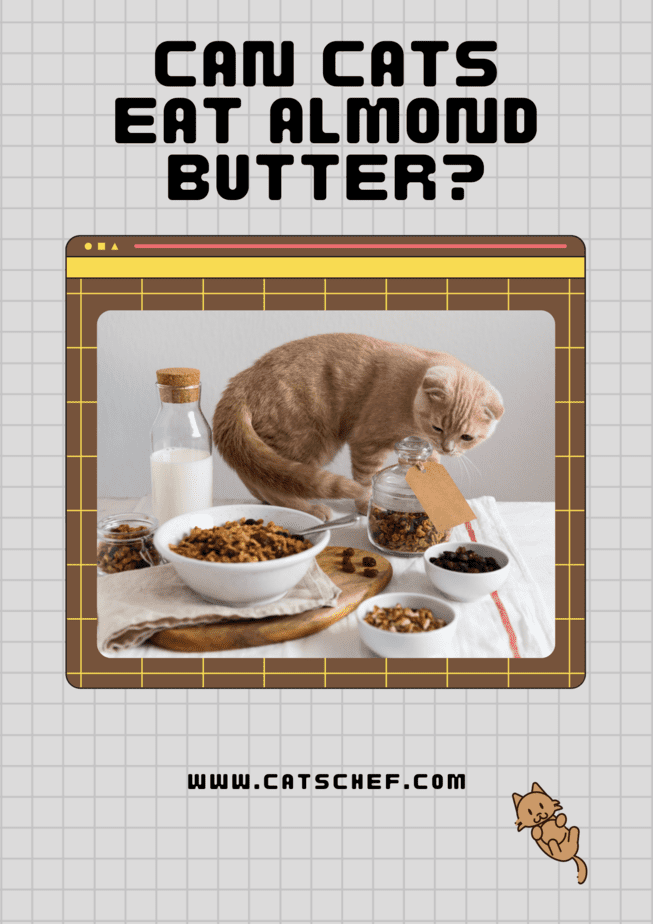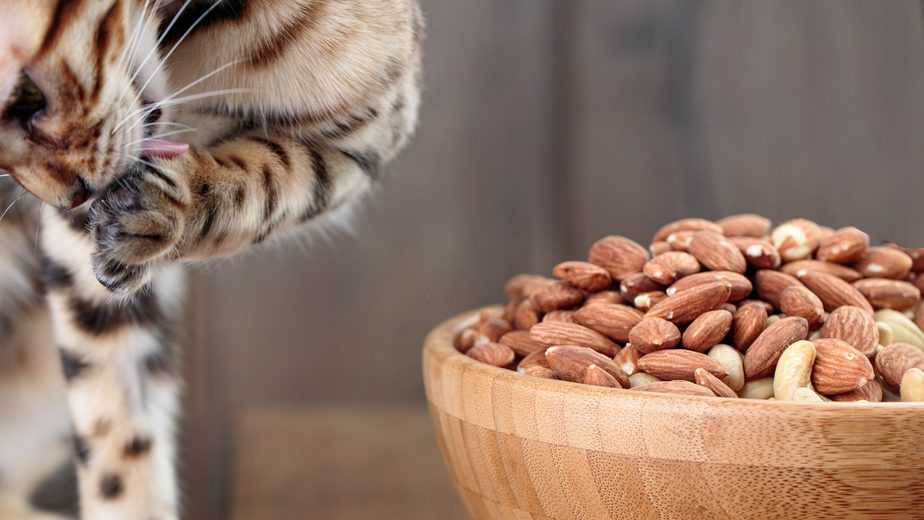Almonds are tree nuts that are highly popular among humans. But can cats eat almonds and other products like almond butter? If you’ve found one or two missing from your bowl, you’ve probably been wondering the same thing.
The nuts themselves are safe and healthy to eat. Next to being loaded with healthy nutrients, almonds are naturally gluten-free. This makes it easier for your cat to digest while gathering all health benefits from them.
Health benefits of almonds
These nuts may be small in size, but they pack a healthy punch. Almonds are rich in fiber and fat. While cats don’t require fiber in their diet, it can help with problems of diarrhea and constipation.
A small number of almonds can regulate your cat’s digestive system. On the other hand, felines require fat to ensure a healthy and balanced diet. Your cat will probably sniff out some almonds on her own because she’s attracted to the fat.
There are around 14 grams of fat in just one ounce of serving of almonds. This high fat concentration is likely to attract and satisfy your cat. Fat intake should be high in the quality diet of a feline, same as with protein.
Protein is what keeps our lap monsters going. Although your pet won’t get as much protein from nuts as from meat, almonds will work well as an occasional snack. However, don’t feed too many as it shouldn’t and won’t replace the animal protein derived from meat.
We have yet to mention that almonds are low in carbs, which is good news for both you and your pet. Carbohydrates are not a necessity in a cat’s diet and therefore, are often useless. The lack of carbs in almonds can only benefit your feline’s digestive system.
Vitamins and minerals in almonds
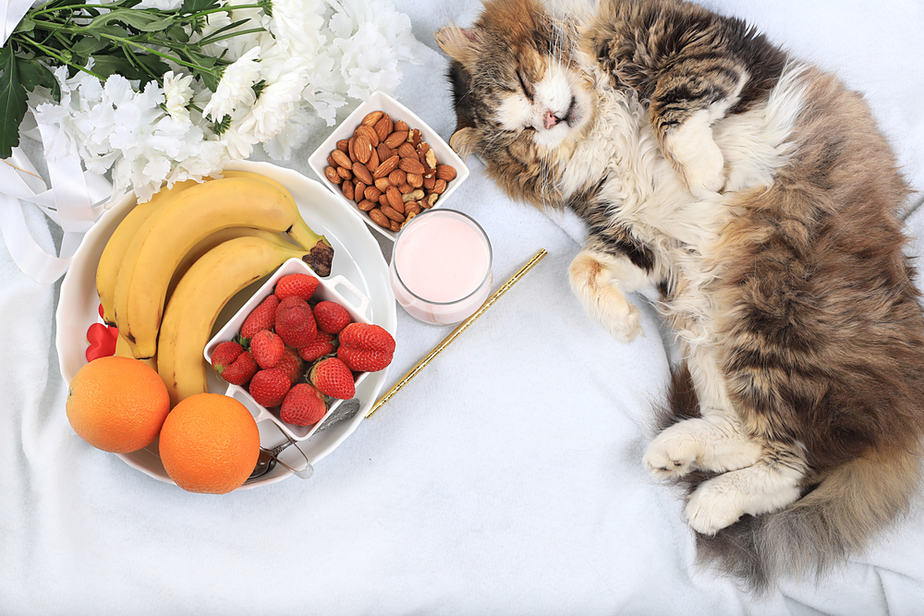
Besides the above-mentioned advantages, almonds are also a great source of vitamins and minerals. For instance, vitamin E found in these nuts serves as an important antioxidant in your cat’s body. This vitamin can prevent heart diseases, as well as cancer.
Another important vitamin found is riboflavin, also known as B2. This nutrient plays an important role in regenerating body cells in your cat’s body.
Apart from vitamins, almonds are packed with minerals such as magnesium that helps with bone, teeth, and claw growth. Thanks to this mineral, your kitty can deliver some mean punches and scratches.
Magnesium also helps in lowering blood pressure levels, which can prevent certain conditions such as stroke, kidney failure, and others. Manganese, copper, and phosphorus can also be found in these healthy nuts. These help in bone strengthening and forming connective tissues.
Alongside these benefits, almonds provide help with forming red blood cells. All in all, they are packed with these great nutrients that may benefit your feline greatly.
Due to the fact that they are low in carbs and high in fat and protein, cats can eat almonds. They are a safe and healthy treat for your pet. It will leave your feline with a feeling of fullness without adding kitty pounds.
Disadvantages of almonds
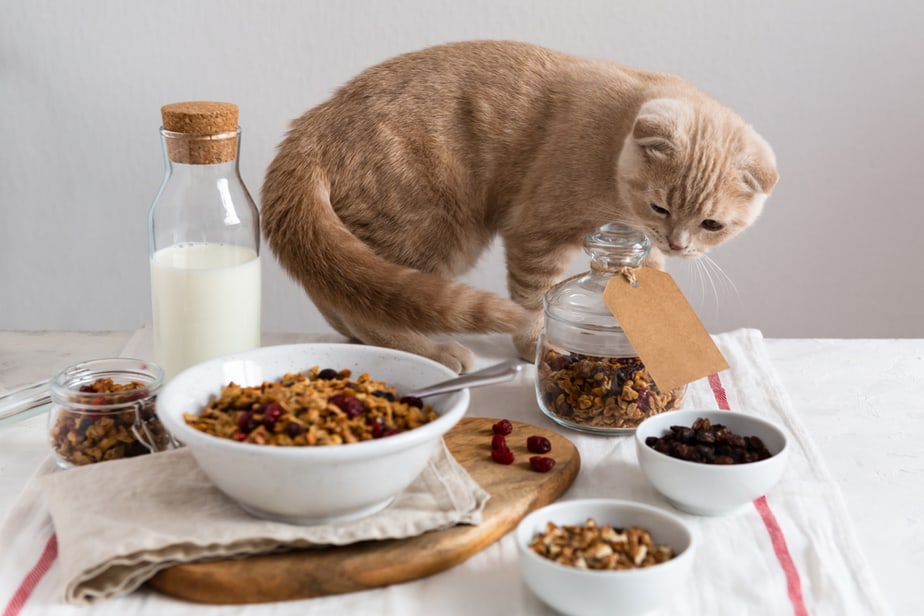
Some almonds may be bitter. These are the types of almonds that contain cyanide, which is toxic to cats. These are unsafe to eat and will eventually lead to poisoning. Stay away from these bitter almonds for the sake of your cat’s safety.
Other than that, almonds can sometimes be tough to swallow. This is sometimes a hard nut to crack, right? Because of their consistency, they could pose a threat to your feline. Beyond being choke hazards, if not chewed properly, these nuts can cause some problems in your cat’s digestive system.
It isn’t strange for your cat to have an allergic reaction to almonds too. Just as with humans, the symptoms include respiratory problems, as well as gastrointestinal problems such as diarrhea and vomiting.
Besides almond allergy, too many almonds can upset your cat’s stomach, especially if she isn’t used to them. Make sure you avoid feeding almonds to your pet if she shows any signs of abdominal pain.
Now for the big question: Can cats eat almond butter?
Because of its array of health benefits and wide use, almonds come in various forms. One of them is almond butter.
A bit of salt and other extracts are often added to store-bought almond butter. This isn’t poisonous to cats, but isn’t ideal either.
While there are beneficial almonds found in almond butter, any excess salt or sugar is useless for your cat. Small quantities of almond butter can be safely ingested, but any more than that could cause some stomach distress.
The truth about almond butter is that more fat, oil, and sugar fit onto a spoon than in one raw almond. This could lead to you overfeeding your feline with almond butter. If she steals a few licks from your toast, it’s fine, but don’t make a habit of letting her eat it.
The thick consistency of almond butter, as is the case with peanut butter, is a choking hazard. Your cat’s unaware of it at first and fine at one moment, but could be choking the other! Make sure this doesn’t happen by giving your cat moderate amounts of almond butter.
So in short, cats can eat almond butter but in small amounts. And make sure when it happens, it’s supervised.
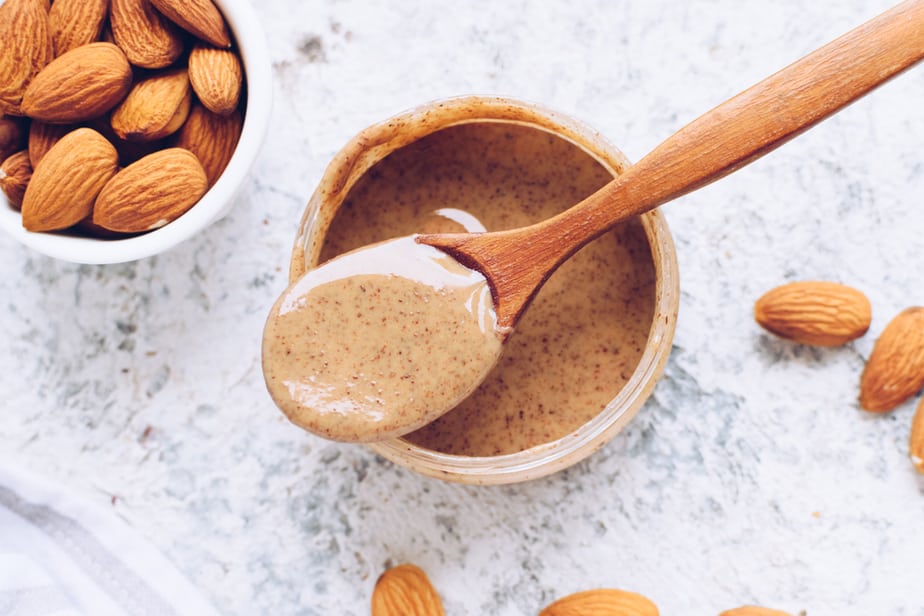
What about almond milk? Is it safe for cats?
Surprisingly, almond milk is totally safe for cats. It doesn’t contain lactose, which is good news for lactose intolerant felines. Drinking almond milk occasionally will keep your cat’s immune system stocked up with vitamins and minerals.
This habit of drinking almond milk can result in stronger bones, a shiny coat, and healthy skin. That is, of course, if your pet isn’t allergic to these nuts.
Almond milk is healthy and super beneficial to your fluff, but be careful. Even though it doesn’t contain any dairy products, your cat might still have problems digesting it. Not all cats are the same and while some can benefit from it, others can have a hard time digesting it.
Can cats digest almond oil?
It depends on whether it’s made from sweet almonds or bitter almonds. The former is usually digested easily by felines. However, bitter almonds can be poisonous to cats because of the compound cyanide.
Almond oil made from these bitter nuts isn’t recommended for your pet. A high concentration of cyanide could be fatal for your fluff. Usually, sweet almond oil isn’t essentially poisonous to felines, but high amounts of fat and calories are bad for them.
Apart from almonds, what other nuts are safe for cats to eat?
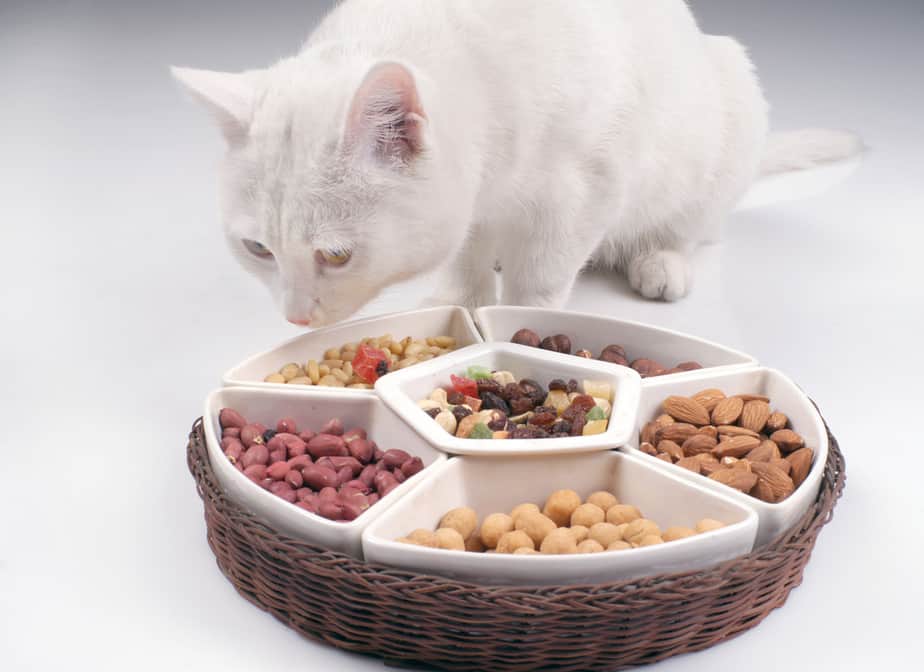
Most nuts are non-toxic to felines and therefore, safe to eat. However, this doesn’t mean they are beneficial. Certain nuts contain vitamins and minerals, as well as other nutrients that may benefit your furry friend.
However, humans and felines aren’t built the same. What may work for us won’t necessarily work for them. While they can get some healthy nutrients from nuts, nuts shouldn’t replace their regular meat-based diet at any cost.
Brazil nuts and cashews are non-poisonous to cats but don’t provide many health benefits. They’re higher in fat than almonds and may cause some gastrointestinal distress.
Other nuts like chestnuts and hazelnuts are also considered safe yet don’t hold any value to your cat’s diet. Not to mention all of these nuts are a potential choking hazard for felines.
So it’s safe to say that cats can eat different nuts in different forms, such as almond butter. However, make sure she sticks to her regular diet and gets sufficient animal protein. Anything other than that serves just as a mere snack.
Final words
To sum up, cats can eat almonds and almond butter – in moderation. Almonds have an array of beneficial nutrients that your cat can profit from. However, almond butter is also high in fat and poses a choking risk.
On the other hand, almond milk is safe for your fluff due to the fact it’s lactose-free. Your furkid can occasionally enjoy some almond milk, however, she should stay clear of almond oil.
Other nuts can be consumed as well, as long as it’s supervised and limited. Most nuts don’t provide cats with needed nutrients as they are obligate carnivores.
To stick to the safe side, though, keep your almond butter jar sealed tight and give only on occasions!
Read more: Can Cats Eat Chickpeas? Are They Dangerous Or Healthy?
